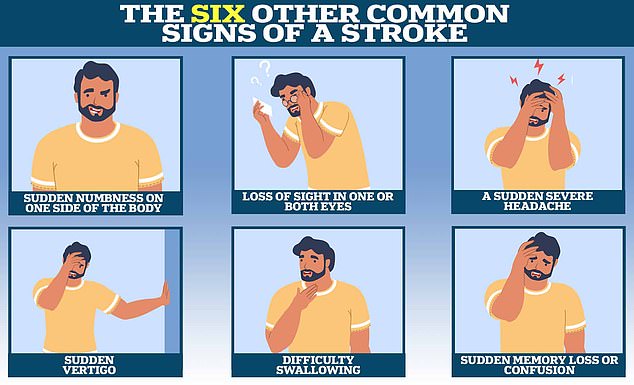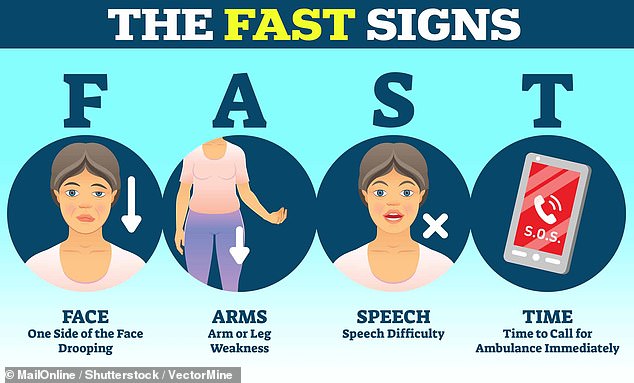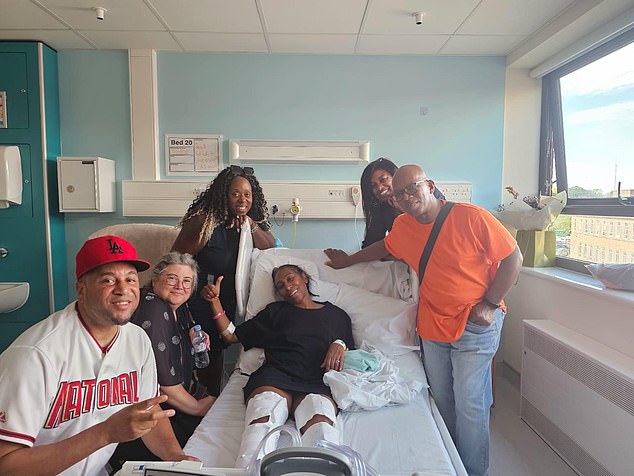Stroke rates among ‘fit and healthy’ men under 40 are soaring – experts reveal alarming reason why
Experts have raised the alarm about a dramatic rise in stroke rates among millennial men – and have blamed junk food diets and a rise in heavy drinking, as well as stressful modern lives.
A MailOnline analysis of NHS data has found that the number of strokes among men under 39 has increased by almost a quarter over the past two decades.
By comparison, the number of life-threatening attacks in women of the same age has increased by only one percent.
In 2004-2005, men under the age of 39 made up 52.8 percent of cases, compared to 47.2 percent for women of the same age.
By 2023-2024, this gap had widened even further, with men accounting for almost two-thirds of all cases, while the share of women fell to 42.3 percent.
It comes weeks after NHS health chiefs warned of a worrying increase in stroke rates among the under-50s.
The number of people aged 50 to 59 suffering from the potentially fatal condition has risen by 55 percent in the past 20 years, official data shows.
Strokes affect more than 100,000 Britons every year – one every five minutes – and claim 38,000 lives.
Lewis Clasby suffered a stroke in his 20s, despite feeling like he was in the best shape of his life.
This makes it the fourth biggest cause of death in Britain and a leading cause of disability.
The problem occurs when the blood supply to the brain is cut off, killing brain cells. The damage can lead to long-term disability and can affect how people think and feel.
The most common cause is fatty deposits or a blood clot that blocks the arteries that supply blood to the brain, also called ischemic stroke.
This happens as a result of cardiovascular disease, in which the blood vessels become narrowed or blocked by plaques over time.
These are made of cholesterol, calcium and other substances that build up in the artery walls in a process known as atherosclerosis.
The other – called hemorrhagic strokes – occurs when a blood vessel in the brain bursts and its contents begin to leak into the organ.
Despite advances in care that are improving survival rates, stroke remains the fourth leading cause of death in Britain, with 38,000 stroke deaths occurring every year.
The new data shows that despite a 43.5 percent decline in stroke mortality since 2001, the prevalence of stroke continues to rise.

Other – just as common – signs of an impending stroke often fall under the radar. These include sudden numbness on one side of the body, sudden dizziness and difficulty swallowing
Carolina Fransen, CEO of mechtech company Alvica Medical, spoke about the increase in young cases and blamed lifestyle factors such as high stress, poor diet, sedentary habits, smoking and excessive alcohol consumption – all of which contribute to causing stroke . high blood pressure.
Additionally, she said, undiagnosed conditions such as atrial fibrillation go unnoticed in younger age groups.
Although data shows that alcohol consumption is declining on average in younger age groups, the number of people drinking to dangerous levels is increasing.
According to data from the Office for National Statistics, the number of men dying from alcohol-related diseases has risen by a third in just five years.
Drinking large amounts of alcohol can increase levels of a hormone that causes blood vessels to constrict, restricting blood flow through the body and increasing the risk of clots.
Mrs Fransen stressed that adopting a healthier lifestyle, quitting smoking, moderating alcohol intake, staying active and recognizing early symptoms can significantly reduce the risk, but many young adults are unaware of this, worsening the outcome.
Experts from The Stroke Association echoed this.
Juliet Bouverie OBE, CEO of the Stroke Association, said: ‘These new figures support our own research that there has been a sharp increase in the number of people affected by stroke over the past twenty years, particularly among those of working age. ‘

Game of Thrones actress Emilia Clarke has repeatedly spoken about the lack of support young stroke survivors have. She suffered a brain hemorrhage at the age of 24
The figures come as the NHS launches a major campaign urging the public to call 999 immediately if someone experiences any of the three most common symptoms of a stroke, including difficulty smiling, raising an arm or to speak unclear words.
Dr. David Hargroves, NHS National Clinical Director for Stroke, warned that even a brief delay in calling 999 could have catastrophic consequences.
He said: ‘When someone has a stroke it is estimated that they lose around two million brain cells per minute. Therefore, prompt diagnosis and treatment is crucial.
‘The first sign of a stroke may not look like much, but face or arm or speech – at the first sign it’s time to call 999.’
Among those affected is Portsmouth salesman Lewis Clasby, who suffered a serious stroke at the age of 29 despite having no pre-existing health problems.
When he collapsed at home, he initially thought he had fainted and fell asleep again.
Even after waking up later in a sweat, he postponed calling an ambulance for fear of wasting emergency responders’ time.
He said: ‘The last thing on my mind was that I might have a stroke.

Symptoms of a stroke are commonly remembered by this four-letter acronym, FAST. Stroke patients may often have their faces droop to one side, have difficulty lifting both arms and may have slurred speech, while time is of the essence as immediate treatment of a transient ischemic attack (TIA) or mild stroke can significantly reduce the risk of stroke. a much deadlier major stroke

Another younger woman who suffered a stroke is Dionne Hudson, 58, who ‘fell back to sleep’ in the minutes after her attack.
“When they told me I had no chance, there was no way I was having a stroke.”
The impact of Clasby’s stroke was devastating as a young person.
He said: ‘I worked so hard to get where I was, in my eyes you’re thirty when you start living.
‘I had just had a child, I had my own house, I had a partner, I literally had everything and within a day it was just gone.
‘My whole life changed in a second.’
Clasby previously worked as a machinist, but had to move to his company’s sales office in the aftermath of the stroke.
Doctors later told him that the stroke was caused by one of the largest blood clots they had ever seen, and initially warned that his chances of walking again were slim.
Reflecting on his recovery, Clasby added, “I understand why old people don’t make the effort (to get better) because often it just seems pointless.”
The increase in the number of strokes among young people occurs against the background of an increasing number of admissions for strokes.
Across all age groups, the number of hospital admissions due to stroke has increased by 28 percent in twenty years, from 87,069 in 2004 to 111,137 in 2024.
The age group between 50 and 59 years saw the largest increase: the number of admissions increased by 55 percent, from 8,063 in 2004 to 12,533 in 2024.
This is compared to a 42 percent increase for the 60-69 age group, and a 25% increase for the 70-79 age group.
Wes Streeting, Secretary of State for Health and Social Care, said: ‘These figures are shocking, especially as the causes of stroke are largely preventable.
Dionne Hudson, 58, suffered an ischemic stroke in July 2024 but initially dismissed her symptoms.
Like Clasby, she also chose not to call 999 and instead went to sleep, unaware she was having a stroke.
She said: ‘There was a voice in my head all night saying, ‘Dionne, you’re having a stroke,’ and it wouldn’t stop.
‘Although I was aware of the FAST campaign, I, like many others, had the prejudice that strokes only occur in the elderly.
“When I woke up, I can only describe it as turning into a human pinball machine.”
Health professionals and charities are united in calling for greater awareness, especially among young people who may not associate strokes with their age group.
Clasby credited his recovery to his mentality and determination, and in a message to young stroke survivors he said: ‘Whatever the circumstances, don’t give up.
‘And don’t be afraid to call 999 like I was.’
